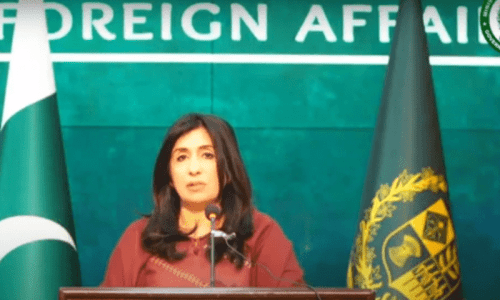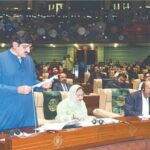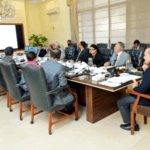ISLAMABAD/SRINAGAR: Pakistan criticized the action as “part of India’s efforts to portray normalcy” in the disputed region as Indian Prime Minister Narendra Modi made his first visit to held Kashmir since he removed the region’s special status under Article 370 of the Indian constitution.
During her weekly news briefing on Thursday, Foreign Office spokesperson Mumtaz Zahra Baloch stated, “We believe that these efforts to project normalcy are a facade and tourism cannot be promoted in a situation where local people are being intimidated and their rights and freedoms are being denied.”
Nearly five years ago, the Muslim-majority Kashmir valley lost its special constitutional status due to the Modi administration, which divided the occupied area into two areas under direct rule from New Delhi. This move infuriated the residents of the heavily militarized region.
Claiming that the region’s potential had been hampered by “dynastic politics” and outdated regulations, he took delight in having revoked the occupied region’s constitutional special status and inherited safeguards of land and jobs for its permanent population.
Modi visits the disputed territory for the first time in five years and declares his pride in removing its special status.
The Hindu nationalist leader was cited by AFP as stating, “I am working hard to win your hearts, and my attempt to keep winning your hearts will continue,” during a public rally in Srinagar.
At the stadium event, Modi declared, “[India-held] Jammu and Kashmir is not just a region, it is the crown of the country.”
Security personnel were spotted on patrol on Thursday, according to AFP, both on foot and on motorboats along the river that passes through Srinagar. The majority of the city’s schools were closed for the day, and government workers were invited to the demonstration by the authorities.
Former Kashmiri chief minister Omar Abdullah claimed that “nearly none” of the people who would attend would voluntarily, accusing the administration of setting up busses to draw people.
Additionally, Modi remotely launched a number of government initiatives and development projects aimed at advancing the agro-economy and tourism in Kashmir and other regions of India. New infrastructure was built as part of the initiatives near the city’s famed Muslim shrine, Hazratbal.
The visit coincides with the first national elections in India since the region’s loss of autonomy, which are scheduled for May. In Kashmir, local elections were last conducted in 2014.
The government of Modi asserts that direct authority by New Delhi over Kashmir ushered in a new era of “peace and development,” but many locals and critics argue that it also marked a sharp reduction in press freedom and human liberties.
Ms. Baloch gave a response that combined cautious optimism with unwavering priorities when questioned about the incoming government’s stance on relations with India.
She said that the selection of a new foreign minister will open the door to determining the course of Pakistan’s diplomatic relations, particularly those with India, as the nation waits for the formation of a new cabinet.
“We will have direction regarding foreign policy and Pakistan’s relations with other countries, including its neighbors, once the Cabinet is in place,” the spokesperson stated. “The Cabinet formation is yet to take place.”
“At that point, we would be better equipped to address questions about how this will affect Pakistan’s relations with India in the days ahead,” she continued. She reiterated Pakistan’s long-standing stance on interacting with all of its neighbors, including India, on the basis of respect and equality while highlighting the nation’s desire for peaceful relations.
Her comments, however, also emphasized how crucial it is to deal with pressing problems that have long soured bilateral ties, such as claims of support for terrorism and worries over extrajudicial and extraterritorial executions that are attributed to India.
Pakistan’s diplomatic approach is still centered on Kashmir, as the Foreign Office has stated that any interaction with India will always give precedence to the disputed region. The spokesperson underlined, “Kashmir will always be a priority when such engagement takes place,” underscoring the importance of the problem to Pakistan’s foreign policy and its relationship with India.








